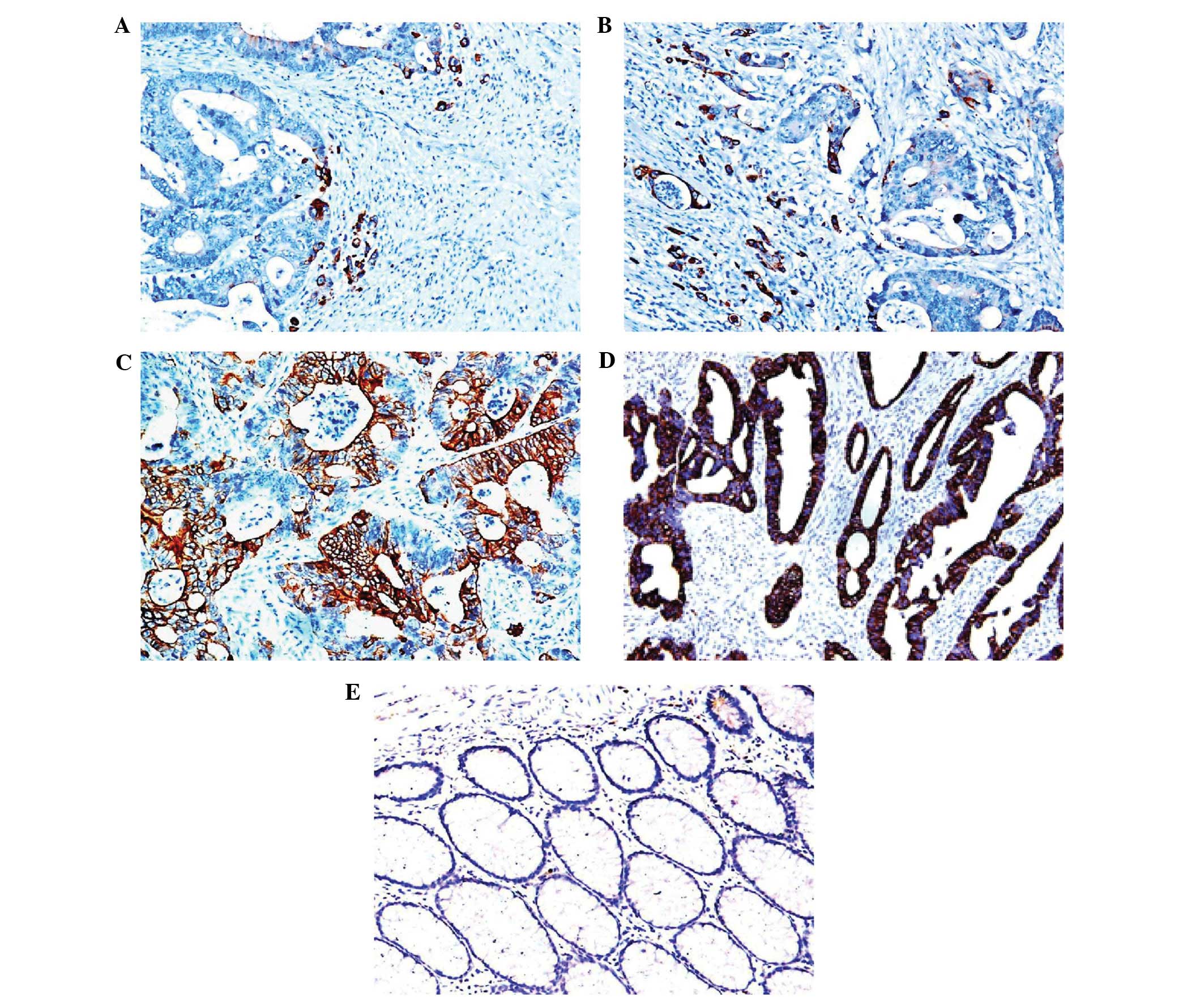|
1
|
Shike M, Winawer SJ, Greenwald PH, et al:
Primary prevention of colorectal cancer. The WHO Collaborating
Centre for the Prevention of Colorectal Cancer. Bull World Health
Organ. 68:377–385. 1990.
|
|
2
|
Jonker DJ, Spithoff K and Maroun J;
Gastrointestinal Cancer Disease Site Group of Cancer Care Ontario’s
Program in Evidence-based Care. Adjuvant systemic chemotherapy for
Stage II and III colon cancer after complete resection: an updated
practice guideline. Clin Oncol (R Coll Radiol). 23:314–322.
2011.
|
|
3
|
Monga DK and O’Connell MJ: Surgical
adjuvant therapy for colorectal cancer: current approaches and
future directions. Ann Surg Oncol. 13:1021–1034. 2006.
|
|
4
|
Ross JS, Torres-Mora J, Wagle N, et al:
Biomarker-based prediction of response to therapy for colorectal
cancer: current perspective. Am J Clin Pathol. 134:478–490.
2010.
|
|
5
|
Karar J and Maity A: PI3K/AKT/mTOR Pathway
in Angiogenesis. Front Mol Neurosci. 4:512011.
|
|
6
|
Foster DA: Phosphatidic acid signaling to
mTOR: signals for the survival of human cancer cells. Biochim
Biophys Acta. 1791:949–955. 2009.
|
|
7
|
Sheppard KE, Cullinane C, Hannan KM, et
al: Synergistic inhibition of ovarian cancer cell growth by
combining selective PI3K/mTOR and RAS/ERK pathway inhibitors. Eur J
Cancer. 49:3936–3944. 2013.
|
|
8
|
Montané MH and Menand B: ATP-competitive
mTOR kinase inhibitors delay plant growth by triggering early
differentiation of meristematic cells but no developmental
patterning change. J Exp Bot. 64:4361–4374. 2013.
|
|
9
|
Kim A, Yim NH and Ma JY: Samsoeum, a
traditional herbal medicine, elicits apoptotic and autophagic cell
death by inhibiting Akt/mTOR and activating the JNK pathway in
cancer cells. BMC Complement Altern Med. 13:2332013.
|
|
10
|
Burris HA III: Overcoming acquired
resistance to anticancer therapy: focus on the PI3K/AKT/mTOR
pathway. Cancer Chemother Pharmacol. 71:829–842. 2013.
|
|
11
|
Vicuna B and Benson AB III: Adjuvant
therapy for stage II colon cancer: prognostic and predictive
markers. J Natl Compr Canc Netw. 5:927–936. 2007.
|
|
12
|
Lenehan PF, Boardman LA, Riegert-Johnson
D, et al: Generation and external validation of a tumor-derived
5-gene prognostic signature for recurrence of lymph node-negative,
invasive colorectal carcinoma. Cancer. 118:5234–5244. 2012.
|
|
13
|
Polak P and Hall MN: mTOR and the control
of whole body metabolism. Curr Opin Cell Biol. 21:209–218.
2009.
|
|
14
|
Guertin DA and Sabatini DM: Defining the
role of mTOR in cancer. Cancer Cell. 12:9–22. 2007.
|
|
15
|
Gough NR: Focus issue: TOR signaling, a
tale of two complexes. Sci Signal. 5:eg42012.
|
|
16
|
Dunlop EA and Tee AR: Mammalian target of
rapamycin complex 1: signalling inputs, substrates and feedback
mechanisms. Cell Signal. 21:827–835. 2009.
|
|
17
|
Gulhati P, Cai Q, Li J, et al: Targeted
inhibition of mammalian target of rapamycin signaling inhibits
tumorigenesis of colorectal cancer. Clin Cancer Res. 15:7207–7216.
2009.
|
|
18
|
Zhang YJ, Zhao SL, Tian XQ, et al:
Combined inhibition of Dnmt and mTOR signaling inhibits formation
and growth of colorectal cancer. Int J Colorectal Dis. 24:629–639.
2009.
|
|
19
|
McCarty MF: mTORC1 activity as a
determinant of cancer risk - rationalizing the cancer-preventive
effects of adiponectin, metformin, rapamycin, and low-protein vegan
diets. Med Hypotheses. 77:642–648. 2011.
|
|
20
|
Su B and Jacinto E: Mammalian TOR
signaling to the AGC kinases. Crit Rev Biochem Mol Biol.
46:527–547. 2011.
|
|
21
|
Jiang H, Shang X, Wu H, et al: Resveratrol
downregulates PI3K/Akt/mTOR signaling pathways in human U251 glioma
cells. J Exp Ther Oncol. 8:25–33. 2009.
|
|
22
|
Ghayad SE and Cohen PA: Inhibitors of the
PI3K/Akt/mTOR pathway: new hope for breast cancer patients. Recent
Pat Anticancer Drug Discov. 5:29–57. 2010.
|
|
23
|
LoPiccolo J, Blumenthal GM, Bernstein WB
and Dennis PA: Targeting the PI3K/Akt/mTOR pathway: effective
combinations and clinical considerations. Drug Resist Updat.
11:32–50. 2008.
|
|
24
|
Marinov M, Fischer B and Arcaro A:
Targeting mTOR signaling in lung cancer. Crit Rev Oncol Hematol.
63:172–182. 2007.
|
|
25
|
Georgakis GV and Younes A: From Rapa Nui
to rapamycin: targeting PI3K/Akt/mTOR for cancer therapy. Expert
Rev Anticancer Ther. 6:131–140. 2006.
|
|
26
|
Ferrandiz-Pulido C, Masferrer E, Toll A,
et al: mTOR signaling pathway in penile squamous cell carcinoma:
pmTOR and peIF4E over expression correlate with aggressive tumor
behavior. J Urol. 190:2288–2295. 2013.
|
|
27
|
Hager M, Haufe H, Lusuardi L, et al: PTEN,
pAKT, and pmTOR expression and subcellular distribution in primary
renal cell carcinomas and their metastases. Cancer Invest.
29:427–438. 2011.
|
|
28
|
Choi CH, Lee JS, Kim SR, et al: Clinical
significance of pmTOR expression in endometrioid endometrial
carcinoma. Eur J Obstet Gynecol Reprod Biol. 153:207–210. 2010.
|
|
29
|
Tampellini M, Longo M, Cappia S, et al:
Co-expression of EGF receptor, TGFalpha and S6 kinase is
significantly associated with colorectal carcinomas with distant
metastases at diagnosis. Virchows Arch. 450:321–328. 2007.
|
|
30
|
Dobashi Y, Suzuki S, Matsubara H, et al:
Critical and diverse involvement of Akt/mammalian target of
rapamycin signaling in human lung carcinomas. Cancer. 115:107–118.
2009.
|
|
31
|
Yu G, Wang J, Chen Y, et al:
Overexpression of phosphorylated mammalian target of rapamycin
predicts lymph node metastasis and prognosis of chinese patients
with gastric cancer. Clin Cancer Res. 15:1821–1829. 2009.
|

















